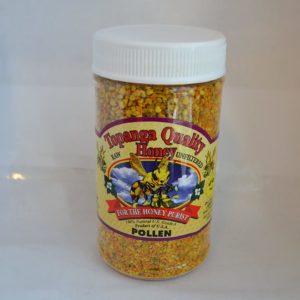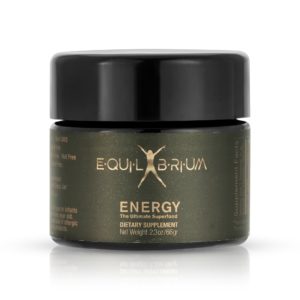Sharing is caring!
It starts with a sniffle. Next comes a sneeze. And then another one or a few. The worst is the itchy eyes that she rubs until puffy. After that, her eyes get watery, which then makes them itchy again. It’s seasonal allergies, and my daughter has it bad.
The problem is, she is only a year and a half old. This means limited options for relief because allergy medication like Benadryl is not recommended for children under two without first speaking with a doctor. This is because it can cause severe or even fatal reactions in some cases. Besides medication like Benadryl causing drowsiness, habitual use can also build up a tolerance.
So while most adults are reaching for over-the-counter medications, I am searching for an all-natural alternative for my daughter. There is one possible solution: bee pollen.
But is bee pollen an allergy cure, or is it just a myth?
Bee pollen is highly recommended by parents looking to prevent and ease their children’s seasonal allergies and symptoms. However, there’s also science to back the many health benefits of bee pollen. According to an article published in Evidence-Based Complementary and Alternative Medicine, bee pollen is used for its many health benefits, including its anti-inflammatory and immunostimulating properties.
“Bee pollen is considered one of nature’s most complete foods due to its comprehensive and balanced nutrient profile,” Dr. Waqas Ahmad Buttar, a family physician at Sachet Infusions, says. “A complete protein rich in vitamins, minerals, enzymes, amino acids, and antioxidants, it is considered an immune system builder that will also enhance vitality.”
What Is Bee Pollen And How Do Bees Make It?
Bee pollen is a tiny pellet that worker bees create. Each pellet is a mixture of flower pollen, honey, protein, carbohydrates, beeswax, bee secretions, and digestive enzymes. This mixture forms a superfood packed with more than 200 substances, including amino acids, lipids (triglycerides, phospholipids), vitamins, macro and micronutrients, and flavonoids.
This includes, on average, 22.7 percent protein and 5.1 percent of essential fatty acids. In addition, bee pollen has vitamins A, C, E, and D, as well as vitamins B1, B2, B6.
“Bee pollen comes from the different flowers that the bees travel to,” says New Jersey beekeeper Bill Coverly of New Jersey Pine Barrens Honey.
There are little hairs on the bees. When they fly through the air they become a positive charge on their body. So when they land on the flower, this pollen will cling to their hairs. Then they begin scraping it because I believe it is annoying to them, and they take it down to their hind legs and use their saliva to pack it on their legs.
Next, the bees carry the pollen pellets to the hive and mix the pollen with honey to make what beekeepers call the “bread.” This is what is fed to the larva.
Beekeepers like Coverly use a bee pollen trap that goes on the entrance of the beehive. The bee has to crawl through the gate, knocking the pollen off her legs and into a tray. This is how beekeepers can collect bee pollen to be sold and consumed. However, the collection of the bee pollen is only done one day a week because the bees need it to feed the young.
Allergy Treatment: Is It Worth A Try?
Consuming bee pollen is believed to stimulate the immune system by exposing a person to the pollen. The more your body is exposed to the allergen, the more it gets used to it and starts building up a tolerance to it without having a severe reaction. Introducing exposure to bee pollen teaches the body how to accept this allergen and not have an adverse reaction. However, always talk to a physician before trying bee pollen. Those allergic to bees should not experiment with bee pollen.
Many advocates of bee pollen report its effectiveness. Bee pollen is being used as an alternative to over-the-counter allergy medications or for those who’ve had adverse effects linked to allergy shots. “I used holistic methods after allergy medicine failed me and I no longer have seasonal allergies,” New Jersey mother Nikita Rae says. “Now, I use this method with my son to help him. Anyone can do this to help build up their immunity.” Not all agree, though. Some people become skeptics after not experiencing major improvements.
The Possible Risk
This natural supplement could also have serious adverse health effects. According to one study, a 30-year-old woman suffered anaphylaxis after taking bee pollen, omega 3-6-9, and vitamin D3. She suffered from seasonal allergic rhinoconjunctivitis and no food allergies or allergies to insects. Doctors advised the patient to avoid bee pollen supplements. This is just an example of one negative case. However, remember that bee pollen is not a complete cure for allergies.
“The evidence is not there to support this claim,” pediatric allergist Dr. Manisha Relan says. “Pollens that bees are attracted to are oftentimes large and in flowering plants, whereas the ones we are allergic to are the invisible ones released by the trees or grass (non-flowering) into the air.”
Those who suffer from hay fever and are allergic to pollen are “almost certainly allergic to the pollen of wind-pollinated flowering plants,” Dr. Waqas Ahmad Buttar adds. This includes allergies to ragweed and several other mid-to-late summer plants that are all wind-pollinated.
According to Dr. Buttar, bees are not collecting pollen from these plants—on purpose. “Very little insect-pollinated plant pollen makes it into the air and does not contribute to seasonal allergies to any great degree,” he says. “Getting inoculated with doses of something you are not likely allergic to will not desensitize you to the airborne pollen that you are sensitive to.” He stresses that while the belief that bee pollen and even local honey is thought to be an effective alternative to medications, it may not have a real impact.
The Possible Reward
However, according to one study, participants reported having fewer and less severe symptoms when researchers added small doses of birch pollen to honey or gave regular honey to those with pollen allergies. According to the results, those treated with the bee pollen had 70 percent fewer days with severe symptoms and twice as many asymptomatic days than the control group. They also used 50 percent fewer antihistamines.
Proper Dosage
Dr. Relan, too, has heard anecdotally how patients who try bee pollen notice an improvement in their allergy symptoms. Still, she urges caution, mostly due to the lack of clear dosage guidelines. Adult recommended dosage is 20 to 40 grams of the pellets or three to five tablespoons per day. Children are recommended to consume 15 grams or one to two tablespoons per day.
Bee pollen farmers recommend those taking it for the first time take two to three granules each day for a week. Then, gradually increase to four to five granules every day. Next, increase slowly to one tablespoon. Some bee pollen users stop at one tablespoon per day, while others then increase to two to three teaspoons a day. What works is subjective. This is why its effectiveness is also subjective.
Bee pollen capsule enthusiasts should read the label for proper dosage. Honey is also not safe to consume for those under the age of 12 months, so Dr. Relan especially doesn’t recommend bee pollen for babies.
The ‘Right’ Way To Use It
The effectiveness of bee pollen to treat seasonal allergies varies. Bee pollen should not be considered a cure for seasonal allergies but rather a way to ease symptoms. Its effectiveness is directly related to whether or not the bee pollen comes from local bees.
“Not all ‘local honey’ is actually local,” bee pollen user Nikita Rae says. “Bees don’t travel that far from their hives. Ingesting honey from somewhere too far away doesn’t expose your body to the correct pollen that you encounter at home.” She says to make sure the hives are within 10 miles of home.
Many adults who purchase bee pollen are open to the idea that it may work for them. But there is a right way to use the local bee pollen to make it worth the try for seasonal allergies. “You really need to start the year prior in order to see results the following year,” Rae says. “It takes time for [bee pollen] to build up in your system and starting the year before gives you the best chances. Local honey won’t completely get rid of allergies, but it will help lessen symptoms.”
Advice For Parents
Learning about holistic methods from her mother, who ran a holistic healing center in Long Branch, NJ, Rae advises speaking to a pediatrician first for bee pollen and local honey for children. Additionally, breastfeeding moms can ask about drinking chamomile tea which helps with ragweed allergies. Rae suggests a diluted tea for children when they are older than one if the pediatrician agrees’.
Since it takes time for the body to build up the immune response, late spring is too late to start using bee pollen for easing spring allergy symptoms, beekeeper Bill says. Instead, it’s recommended to start consuming bee pollen in the middle of February for springtime.
How To Consume Bee Pollen For Health Benefits
Bee pollen is the primary source of food for the hive. Bee pollen is added to food or drink for humans, such as a salad topping or a smoothie to prevent seasonal allergies and its many health benefits. This includes possible liver health, an immune system boost, and metabolism improvements. While its effectiveness for allergies varies or may not be large, taking bee pollen can be worth it when also looking to reap the other health benefits it may provide.
Coverly says the taste of bee pollen depends on the flowers it comes from. This could be tasteless, bitter, or sweet. “You are getting a mixture of all the flowers that are blooming at that time,” he adds.
This beekeeper of close to 30 years isn’t a fan of the taste. But, he does mix it with yogurt or ice cream for its health benefits. Along with being a smoothie bowl topping as seen in trendy recipes, the bee pollen can also be added to water to help with seasonal allergies.
The Jury Is Still Out
My daughter has yet to try bee pollen to treat her seasonal allergies. But researching the health benefits of bee pollen is enough to have me ready to try it for myself before my fall seasonal allergies start to bother me.
Bee pollen has scientific research to back its various health benefits, including its positive influence on combating inflammation. While there is no proof that it can cure seasonal allergies, bee pollen is believed to be effective for some. It might not be recommended for babies, but adults report success with using bee pollen to treat allergies. While this is anecdotal evidence, not research-backed, it can be worth a try for those looking for all-natural allergy relief.

Lauren Keating is a freelance reporter who specializes in health and fitness reporting. With a B.A. in journalism from Brooklyn College, her stories have been published in Youth Runner magazine, thehealthjournals.com, RunnerClick.com, and Tech Times. She is also a certified personal trainer and running coach.
-
 Bennett’s Honey Farm: Bee Pollen$20.99Rated 5.00 out of 5 based on 5 customer ratings
Bennett’s Honey Farm: Bee Pollen$20.99Rated 5.00 out of 5 based on 5 customer ratings -
 Equilibrium Energy Superfood 2.3 oz$59.45 — or subscribe and save 5%Rated 4.91 out of 5 based on 11 customer ratings
Equilibrium Energy Superfood 2.3 oz$59.45 — or subscribe and save 5%Rated 4.91 out of 5 based on 11 customer ratings
- Tags: allergies, Bee Pollen



